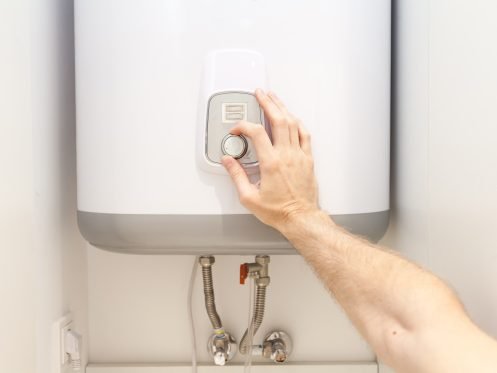Having your water heater suddenly fail is never any fun. Not only is it fairly expensive to replace a water heater, but you could be left without hot water for a few days until you can get a new unit installed. In the summer, that means either dealing with being sweaty and smelly or trying to find somewhere else where you can shower.
The best way to avoid your water heater failing is to make sure you know the signs of an aging or failing water heater and be proactive by getting your water heater replaced before it’s too late. Here, we’ll explore what these signs are and also compare the options when you need to install a replacement water heater.
Water Heater Tank Is Leaking
Tank water heaters can leak from one of three places: the drain valve, the pressure-relief valve or the tank itself. The internal seal in either of the valves can sometimes wear out, resulting in the valve beginning to leak. In this case, a plumber can fix the leak by draining the tank and replacing the valve.
The pressure-relief valve will also automatically open and allow some water out to reduce the pressure in the tank if it ever gets too high. This is important as the tank could explode if the pressure were to reach a certain point.
If you find that the pressure-relief valve is opening occasionally, it’s important to have your water heater inspected. In most cases, this issue happens because of a problem with the temperature control that’s causing the unit to heat the water to a higher temperature than it should.
If you notice water leaking out of the tank, you need to contact a plumber immediately for a replacement. This issue indicates that part of the tank has begun to rust through, creating a chance of the tank rupturing. Major flooding will obviously occur if the tank ruptures, which is why it’s important to immediately shut off the water to the unit by closing the valve on the cold water inlet pipe.
Tank Water Heater Is 8-10 Years Old
Although you can find stainless steel water heaters, most units have a normal steel tank. Steel experiences extensive rust when exposed to water. To prevent this, the inside of the tank is coated with glass or ceramic, which creates a barrier between the water and the steel.
Minerals in the water can also react with the steel and cause it to corrode. This is why water heaters have an anode rod, which essentially gets sacrificed as the minerals react with its metal coating instead of the tank.
The issue is that the glass or ceramic coating deteriorates over time, eventually resulting in the steel being exposed and starting to rust. The coating on the anode rod also typically gets fully corroded and eaten away in five years at the most.
At that point, the minerals begin causing the tank to corrode and eating away at the steel. The combination of these two issues is why an old water heater will almost always start leaking at some point.
You can sometimes get 12 or more years of life out of a tank water heater, but many units don’t last for more than eight to 10 years. That’s why many manufacturers only offer six- or eight-year warranties.
After this point, there’s an increasingly high chance of the tank starting to leak or the unit just failing or no longer working effectively enough. That’s why it’s a good idea to start looking into a replacement if your water heater is at this age or older.
Water Takes a Long Time to Reheat
Whenever you run out of hot water, you’ll always have to wait some time before the water in the tank is again fully hot. This recovery time is typically anywhere from 30 minutes to two hours, depending on the size of the tank and whether the water heater is gas or electric. Electric water heaters heat more slowly and typically have a recovery time of at least one hour.
You will often experience slightly longer recovery times during the winter due to the water that flows into the tank being colder. Otherwise, the recovery times should always be about the same. If you notice you now have to wait longer until you again have hot water, it’s a sure indication that your water heater isn’t heating effectively and may be starting to wear out.
However, if you have an electric unit, long recovery times can also indicate that one of the heating elements is worn out. In this case, you can often get the unit working properly again just by having the heating element replaced.
Water No Longer Gets as Hot
Having your water no longer get as hot as you want is always frustrating. This issue can happen because of a failed heating element or an issue with the temperature control. However, it can also just be a sign that your water heater is starting to give out.
Hot Water Runs Out Faster
Another thing to watch for is if you run out of hot water faster than normally. This will often start happening if the lower heating element has failed or because the dip tube is broken. The dip tube ensures that the incoming cold water flows out at the bottom of the tank and doesn’t mix with the hot water.
If it breaks, the cold water will quickly start decreasing the temperature in the tank and cause the water to run cold much faster. Sediment accumulation can also lead to this issue, as the sediment can take up substantial space and decrease the volume of water the tank holds.
Unfortunately, if the sediment layer gets to this point, you usually won’t be able to flush it out and will need to replace the water heater. That’s why it’s important to flush the tank once or twice a year to remove the sediment.
Knocking or Banging Noises
A knocking or banging sound when your gas water heater is running is also a sign that there’s a large amount of sediment in the tank. What happens is that air bubbles form at the bottom of the tank and then rise up through the sediment, disturbing pieces of sediment and causing them to hit against the tank.
Tank vs. Tankless: Which Water Heater Is Best for Southern Homes?
Installing a tank water heater can costs less than installing a tankless unit. Not only are tankless units more expensive, but you also have to adapt the existing plumbing for a tankless unit.
Nonetheless, tankless water heaters have numerous advantages. One is that they are more efficient and typically use anywhere from 10% to 35% less energy. You’ll usually get at least 15-20 years of life out of a tankless unit as well.
Another major advantage is that tankless water heaters can provide unlimited hot water, ensuring you never need to worry about running out and the water going cold. All of these benefits mean that installing a tankless unit is usually the superior choice if you can afford the extra cost.
If you’re worried about your water heater potentially failing this summer, Kennon Heating, Air & Plumbing can help you get a quality replacement. We offer tank and tankless units from reputable brands and will help you find the best unit for your home.
Our team can also take care of any repairs to get your water heater working again. To schedule a replacement or a water heater inspection in Cumming, GA, or the surrounding areas, contact us today.



